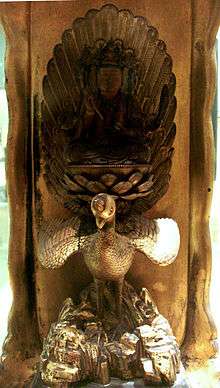Mahamayuri

Mahamayuri statue. Musée Guimet
Mahamayuri (Sanskrit: महामायूरी Mahāmāyūrī, Chinese: 孔雀明王 Kǒngquè Míngwáng, Vietnamese: Khổng Tước Minh Vương, Japanese: 孔雀明王 (Kujaku Myōō), Korean: 공작명왕 GongJakMyeongWang), is one of the Wisdom Kings in the Buddhist Pantheon. Mahamayuri is a peaceful personification, in contrast to the wrathful attitudes of male personifications of the Wisdom Kings.[1] Mahamayuri had the power to protect devotees from poisoning, either physical or spiritual.[2][3]
Mahamayuri's dharani, translated into Chinese by Kumārajīva, is considered to predate Mahayana Buddhism.[4] It contains the only mention of the Rig Veda in the entire Chinese Buddhist canon.
See also
Notes
This article is issued from Wikipedia - version of the 10/25/2016. The text is available under the Creative Commons Attribution/Share Alike but additional terms may apply for the media files.
